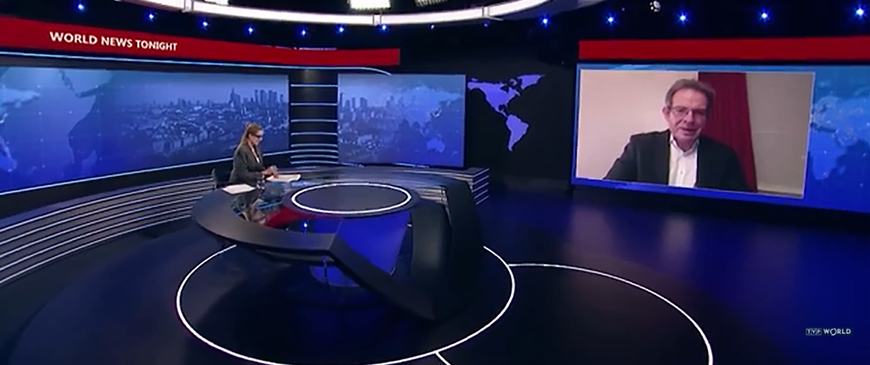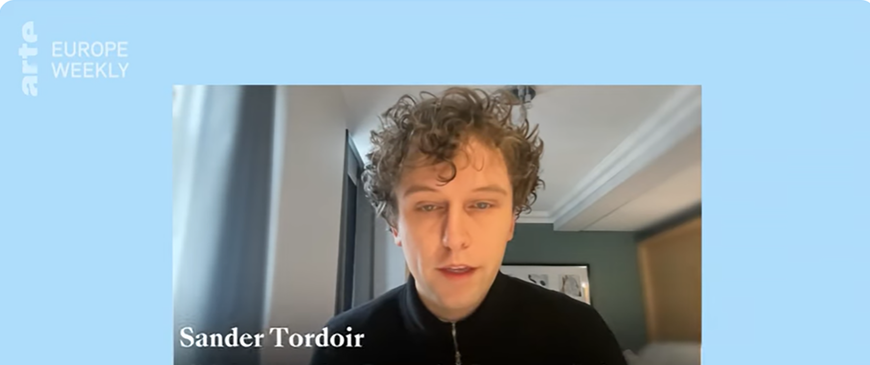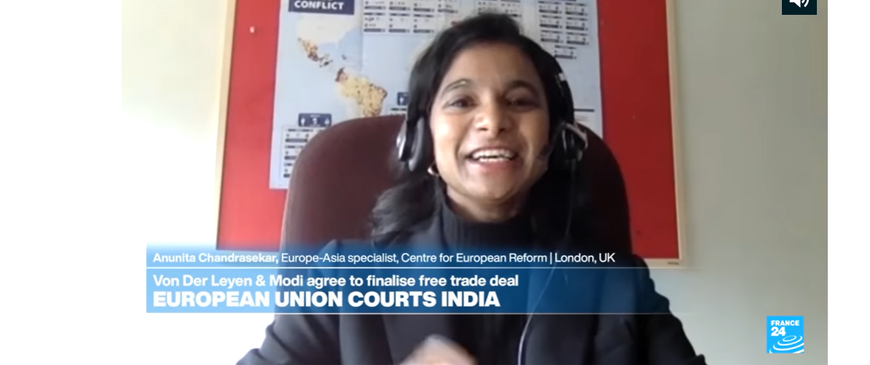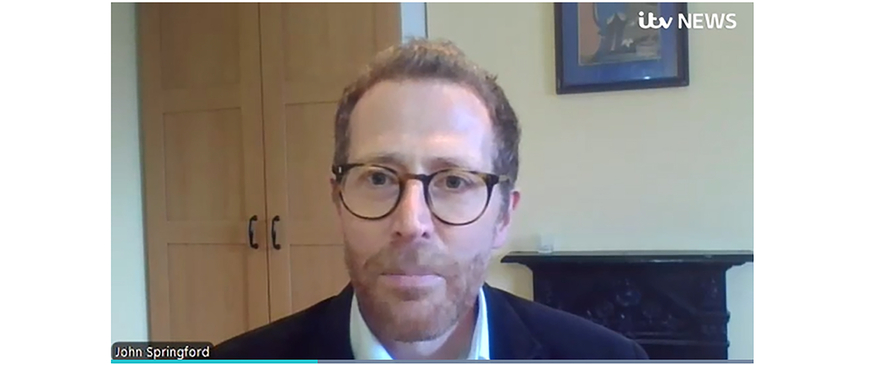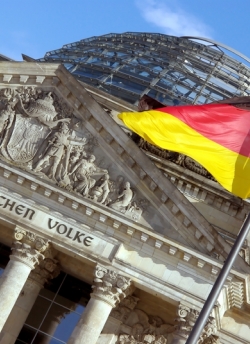Press
Erdogan rebuffs US, insists Turkey isn't Iran ally
17 June 2010
Bloomberg
Divergence from the US on Iran is "not an anti-American move, it's a pro-Turkey move that happens to benefit Iran," said Katinka Barysch, an analyst at the Centre for European Reform in London. Erdogan's move away from lockstep with the West increases his credibility in the region, which means "we can use Turkey's access to countries like Syria and perhaps even to Hamas for mediation," Barysch said.
EU warned about erecting new barriers to growth
17 June 2010
EurActiv
Rodrigues's criticisms were echoed by Simon Tilford, chief economist at the London-based Centre for European Reform. "The eurozone economy is not strong enough to cope with the contractionary effects of a generalised budgetary tightening. And if the eurozone falls back into recession, there will be no chance of putting public finances on a sustainable footing." Some countries with high debt or budget deficits – such as Greece, Portugal and Spain, for example – have little option but to cut spending now, Tilford said.
EU eyes quick move on stress tests as leaders meet
17 June 2010
Reuters
"The German government believes it is leading by example in embarking on a severe round of budget cuts. But this is the last thing the eurozone needs at this point," said Simon Tilford of the Centre for European Reform in a research note this week.
A burst of summitry may backfire against euro
16 June 2010
New York Times
"There is an obvious logic to this happening at 16," argued Charles Grant, director of the Centre for European Reform. "It's harder to have a discussion at 27 and the contribution of some of those not involved in the eurozone is less relevant. The more often they meet … the more they become like a college and start to understand each other." … Mr Grant highlights the need for labour market reform in southern Europe and for eurozone imbalances to be reduced through an increase in demand in Germany.
Analysis - Coalition's EU honeymoon may not last
16 June 2010
Reuters
Charles Grant, director of the Centre for European Reform think tank, said the coalition had made a good start. "There's a lot of relief that the new government is not as Eurosceptic as people thought it would be. But there was also regret in Europe that Britain was not more active in tackling the eurozone crisis. Big questions of economic governance are being debated and Britain is ... marginalised and not really involved," he said.
Europe slowly making workers retire later
16 June 2010
Marketplace
"The Greeks have one of the longest life expectancies in the world, yet their average retirement age remains well under 60," says Simon Tilford, who analyses the European economy for the Centre of European Reform. … raising the retirement age is a very good way of dealing with the crisis over public debt. It should convince investors that a government's finances are on the right track, but it won't take cash out of the economy now and jeopardise Europe's fragile recovery.
Europe stares into the abyss
16 June 2010
Open democracy
I started to learn about this as I attended a fascinating afternoon of discussion yesterday at the European Council on Foreign Relations held jointly with Charles Grant's Centre for European Reform. It made the debates over the Labour leadership and the UK budget seem childish. In the first session Paddy Ashdown lambasted the fashionable hostility to the EU. "Either deepen of die" was his warning. It seems his party's Conservative coalition partners can't see what the fuss is about.
Merkels bezuiniging is onverantwoordelijk
14 June 2010
NRC Handelsblad
Het Duitse besluit om sterk te gaan bezuinigingen is volkomen verkeerd. De Duitsers moeten juist gaan consumeren, betoogt Simon Tilford.
Elke economie in de eurozone slaat halsoverkop aan het hakken in de overheidsuitgaven. Het lijdt geen twijfel dat de eurozone en de EU als geheel een grote uitdaging op begrotingsterrein te...
Elke economie in de eurozone slaat halsoverkop aan het hakken in de overheidsuitgaven. Het lijdt geen twijfel dat de eurozone en de EU als geheel een grote uitdaging op begrotingsterrein te...
EU leaders try to convince markets over euro crisis
13 June 2010
Reuters
"Policymakers in the EU have been rumbled. They've regularly fallen behind the curve and their announcements have often been full of smoke and mirrors," said Philip Whyte of the Centre for European Reform think tank. "The markets don't see how the southern European states are going to get out of the predicament they are in."
Turkey needs suppliers to fuel energy hub role
11 June 2010
Financial Times
Katinka Barysch at the Centre for European Reform notes that US exploitation of shale gas has changed the global market. Europe, unlikely to match the US shale gas boom, is now the only big buyer of liquefied natural gas. "LNG imports mean more competition in a market hitherto dominated by 30-year contracts with fixed volumes and prices linked to the international oil price… Gazprom and other suppliers will have to make a bigger effort to be cheap and reliable," she writes.
Spain seeks EU backing on plan to lift Israeli blockade of Gaza
10 June 2010
The Guardian
"We are seeing a sense of disarray with several voices speaking at the same time," said Clara O'Donnell of the Centre for European Reform. "But even if the EU is keen to help, the Israelis do not consider it reliable enough. There is not much Europe can do until the Americans move."
Greek crisis hangs over EU economic summit
08 June 2010
Financial Times
"Naming and shaming" countries that underperform remains a possibility, however. "The broad thrust of the agenda remains as valid today as it was back then [in 2000]," said Philip Whyte of the Centre for European Reform. "A decade on, many EU countries still suffer from low employment and low productivity. So residual barriers to intra-European trade need to be dismantled and more must be done to encourage entrepreneurship and innovation."
Europe needs more than fiscal prudence
08 June 2010
Financial Times
As Philip Whyte observes in a piece for the CER (Eurozone governance: Why the Commission is right), Germany's position is "one-eyed". When the global financial crisis erupted in 2007-2008, Spain was running a budget surplus, not a deficit, and its present difficulties have very little to do with government irresponsibility. They have been caused by a housing market bubble, an over-extended banking sector, very high levels of private sector debt and a rigid labour market that has exacerbated Spain's long-term loss of business competitiveness.
Germany signals end of love affair with Europe
02 June 2010
The Guardian
"In the history of the European Union," said Charles Grant, director of the Centre for European Reform think tank, "I've never seen Germany so isolated before."
The eurozone expands despite doubts
31 May 2010
Newsweek
Some candidates "would be better members than many of the existing ones," says Simon Tilford of the CER. "But the spectre of Greece means there is very little stomach for taking on new members."
Hurdles remain for non-Russian gas pipeline
30 May 2010
The Daily Telegraph
Katinka Barysch, of the CER, believes the pipeline is still crucial. In a discussion paper published this month, she points out "Energy forecasters say that the global gas glut is temporary.Between 2015 and 2020 global markets will tighten. All of Nabucco's problems – lack of demand, finance and supplies – have a plausible solution. Even if it is further delayed and not ready for gas shipments in 2014, it still makes sense to build it, both commercially and politically."
Humbled by crisis, Russia and the EU eye summit reset
29 May 2010
CNBC
But a better atmosphere will not necessarily translate into an ambitious summit agreement, said Katinka Barysch, deputy director of the CER. "The relationship looks better, feels better, smells better," said Barysch. "Whether that can be translated into concrete achievements remains to be seen."
La dolce vita sours in Europe
29 May 2010
Montreal Gazette
Philip Whyte, an economic analyst with the CER, said the spending cuts and tax increases could push parts of Europe into a prolonged slump. He also said the kind of unrest this month in Greece, when protesters firebombed police and set fire to a bank that left three dead, could spread. "Greece is the thin edge of the wedge, and not just in southern Europe.
EU struggles to convince markets in euro crisis
28 May 2010
Reuters
"This is the worst possible message they [Germany] could be sending the markets because it suggests they are still not acknowledging what the underlying problem here is," said Simon Tilford, chief economist at the CER. "Far from reassuring the market and stabilizing market sentiment, this will further undermine confidence in the ability of eurozone governments and policymakers to get on top of the crisis. It will aggravate the situation further."
Euro exit is no soft option
26 May 2010
Daily Mail
Experts, including Charles Grant, director of the Centre for European Reform, do not exclude the possibility of Greece exiting down the road. But the rest are likely to 'muddle through,' he argues. "There is a lot of hot air about the eurozone breaking up," says Grant. "'But don't underestimate the political will there is to keep it together."

